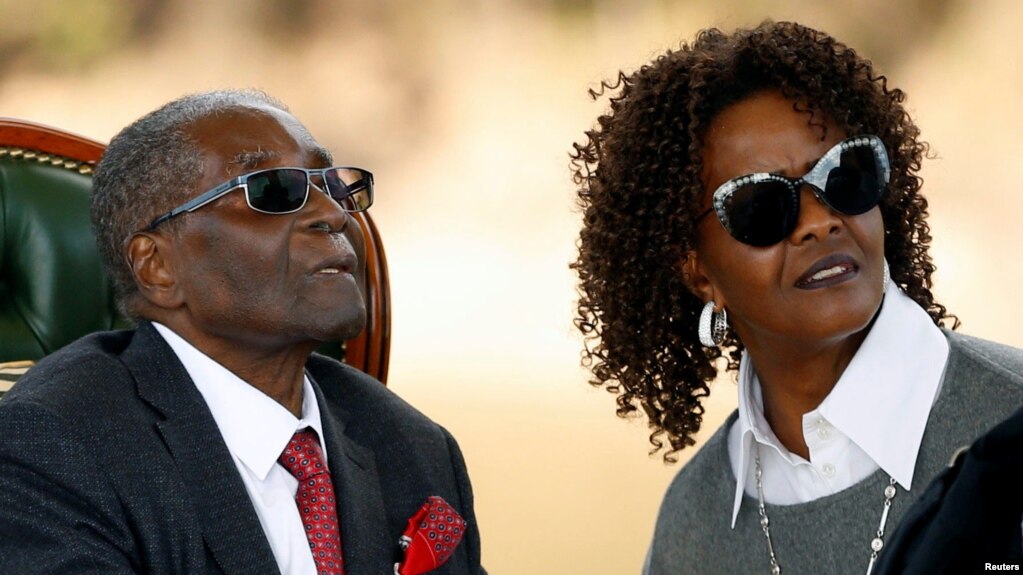
Former president Robert Mugabe, 94, cast his vote in a Harare township on Monday in Zimbabwe’s first election that does not include his name on the ballot paper.
A frail Mugabe, accompanied by his wife, Grace, shuffled into the polling booth and spent several minutes filling in his ballot paper with the help of an assistant. A huge crowd gathered outside, some cheering, many booing.
Mugabe was removed last November in a de facto coup that brought his former ally Emmerson Mnangagwa to power but he’s hardly faded away. Ahead of this month’s historic election, dozens of people in T-shirts with his image danced to anti-government songs while vowing revenge.

The 94-year-old Mugabe, who led this southern African nation through 37 turbulent years before his dramatic, military-backed resignation in November, has emerged as a player ahead of the July 30 vote — on the side of the opposition.
anger over Mugabe’s removal has been channeled into supporting candidates who challenge the ruling ZANU-PF party that he long controlled.
“They removed Comrade Mugabe using military force. We should show them that the ballot box is supreme to the gun,” thundered Phionah Riekert, a 31-year-old loyalist of Mugabe and his wife, Grace. Youths and elderly women punctuated her campaign speech with song, dance and the beating of drums

Before the election, Mugabe said he would not vote for his former party Zanu-PF or the current president, Emmerson Mnangagwa, in an astonishing intervention on the eve of Zimbabwe’s historic election.
In his first major statement since being ousted by the military last November, the 94-year-old former dictator told reporters in Harare he would be voting for the Movement for Democratic Change (MDC), the country’s biggest opposition party, and its candidate, 40-year-old Nelson Chamisa.
“I cannot vote for the party or those in power who caused me to be in this condition. I cannot vote for them, I can’t,” Mugabe said at a hastily called, chaotic press conference in the garden of his sprawling home in Harare. “[Chamisa] seems to be doing well at his rallies … I wish to meet him if he wins. Whoever wins, we wish him well … And let us accept the verdict.”

The former autocrat’s decision not to back the party he led to victory in Zimbabwe’s independence war and for 37 years as president is the latest twist in an extraordinary election that will determine the former British colony’s future for decades.
It is unclear how the intervention will influence the close contest. Mugabe’s call to vote out what he described as an “unconstitutional and illegal” government may win over some voters, but put off others.
Wearing a dark suit, white shirt, red tie and matching pocket handkerchief, with his frail frame propped up by tiger-skin patterned cushions, Mugabe described his November ousting as a coup. He accused the military of suppressing democracy, arguing that his own rule was legitimate because he held elections every five years.
“These tanks that roared across the country, whom were they fighting? Who was the enemy? We were fighting ourselves.
“The army has turned against the very people they fought for. I say ‘no’. This is wrong. There should be a big no to guns directing politics,” the former guerrilla leader said.
“Let tomorrow be the voice of the people saying never again, never again will we experience … the army being used to thrust one person into power.”
Mugabe denied accusations that he had ever used force to suppress dissent, although successive elections in Zimbabwe under his rule were marked by well-documented violence and the systematic intimidation of opposition activists and supporters. Media and civil society also suffered fierce repression.
Mnangagwa, who was one of Mugabe’s closest aides, has been under pressure to shun such tactics and experts say the current election campaign has been the most peaceful for many decades. Without international approval of the poll, no incoming administration will get the billions of dollars of aid needed to restore Zimbabwe’s shattered economy. Fears of rigging remain, however.

Mugabe denied reports that he had assisted the MDC’s campaign, saying he had never met Chamisa, but the former teacher turned freedom fighter, who took power in an independent Zimbabwe in 1980 after a brutal struggle against a white supremacist regime, is still so central to the political life of his country that his endorsement became the focus of questions at a parallel press conference held by the MDC leader on Sunday.
“Mr Mugabe’s wishes are his wishes,” Chamisa said. “I am going to accept any voter with open hands. The more the merrier.”